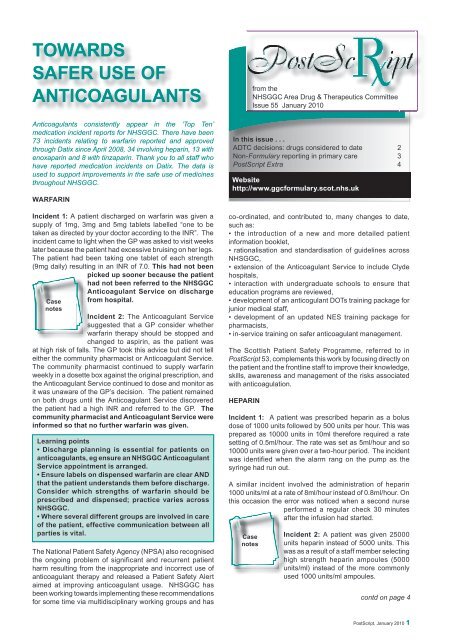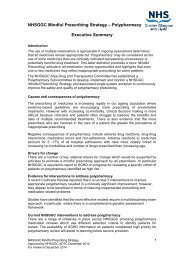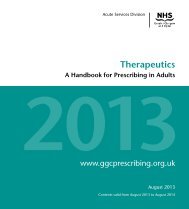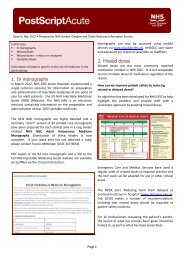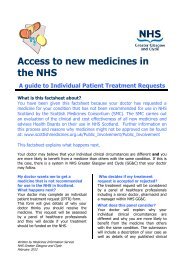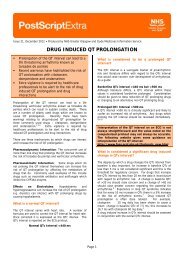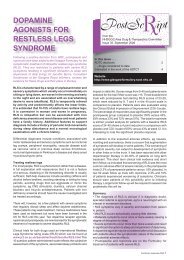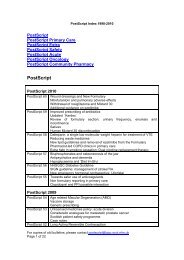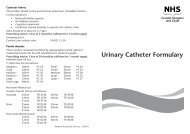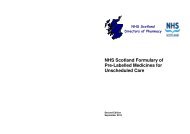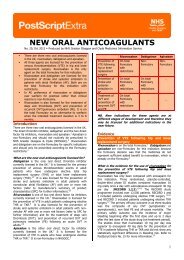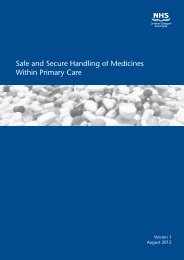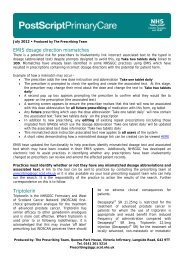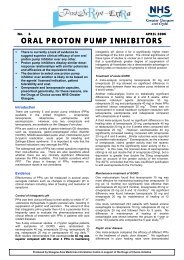TOWARDS SAFER USE OF ANTICOAGULANTS - GGC Prescribing
TOWARDS SAFER USE OF ANTICOAGULANTS - GGC Prescribing
TOWARDS SAFER USE OF ANTICOAGULANTS - GGC Prescribing
Create successful ePaper yourself
Turn your PDF publications into a flip-book with our unique Google optimized e-Paper software.
<strong>TOWARDS</strong><br />
<strong>SAFER</strong> <strong>USE</strong> <strong>OF</strong><br />
<strong>ANTICOAGULANTS</strong><br />
Anticoagulants consistently appear in the ‘Top Ten’<br />
medication incident reports for NHS<strong>GGC</strong>. There have been<br />
73 incidents relating to warfarin reported and approved<br />
through Datix since April 2008, 34 involving heparin, 13 with<br />
enoxaparin and 8 with tinzaparin. Thank you to all staff who<br />
have reported medication incidents on Datix. The data is<br />
used to support improvements in the safe use of medicines<br />
throughout NHS<strong>GGC</strong>.<br />
WARFARIN<br />
Incident 1: A patient discharged on warfarin was given a<br />
supply of 1mg, 3mg and 5mg tablets labelled “one to be<br />
taken as directed by your doctor according to the INR”. The<br />
incident came to light when the GP was asked to visit weeks<br />
later because the patient had excessive bruising on her legs.<br />
The patient had been taking one tablet of each strength<br />
(9mg daily) resulting in an INR of 7.0. This had not been<br />
picked up sooner because the patient<br />
had not been referred to the NHS<strong>GGC</strong><br />
Anticoagulant Service on discharge<br />
from hospital.<br />
Case<br />
notes<br />
Incident 2: The Anticoagulant Service<br />
suggested that a GP consider whether<br />
warfarin therapy should be stopped and<br />
changed to aspirin, as the patient was<br />
at high risk of falls. The GP took this advice but did not tell<br />
either the community pharmacist or Anticoagulant Service.<br />
The community pharmacist continued to supply warfarin<br />
weekly in a dosette box against the original prescription, and<br />
the Anticoagulant Service continued to dose and monitor as<br />
it was unaware of the GP’s decision. The patient remained<br />
on both drugs until the Anticoagulant Service discovered<br />
the patient had a high INR and referred to the GP. The<br />
community pharmacist and Anticoagulant Service were<br />
informed so that no further warfarin was given.<br />
Learning points<br />
• Discharge planning is essential for patients on<br />
anticoagulants, eg ensure an NHS<strong>GGC</strong> Anticoagulant<br />
Service appointment is arranged.<br />
• Ensure labels on dispensed warfarin are clear AND<br />
that the patient understands them before discharge.<br />
Consider which strengths of warfarin should be<br />
prescribed and dispensed; practice varies across<br />
NHS<strong>GGC</strong>.<br />
• Where several different groups are involved in care<br />
of the patient, effective communication between all<br />
parties is vital.<br />
The National Patient Safety Agency (NPSA) also recognised<br />
the ongoing problem of significant and recurrent patient<br />
harm resulting from the inappropriate and incorrect use of<br />
anticoagulant therapy and released a Patient Safety Alert<br />
aimed at improving anticoagulant usage. NHS<strong>GGC</strong> has<br />
been working towards implementing these recommendations<br />
for some time via multidisciplinary working groups and has<br />
from the<br />
NHS<strong>GGC</strong> Area Drug & Therapeutics Committee<br />
Issue 55 January 2010<br />
In this issue . . .<br />
ADTC decisions: drugs considered to date 2<br />
Non-Formulary reporting in primary care 3<br />
PostScript Extra 4<br />
Website<br />
http://www.ggcformulary.scot.nhs.uk<br />
co-ordinated, and contributed to, many changes to date,<br />
such as:<br />
• the introduction of a new and more detailed patient<br />
information booklet,<br />
• rationalisation and standardisation of guidelines across<br />
NHS<strong>GGC</strong>,<br />
• extension of the Anticoagulant Service to include Clyde<br />
hospitals,<br />
• interaction with undergraduate schools to ensure that<br />
education programs are reviewed,<br />
• development of an anticogulant DOTs training package for<br />
junior medical staff,<br />
• development of an updated NES training package for<br />
pharmacists,<br />
• in-service training on safer anticoagulant management.<br />
The Scottish Patient Safety Programme, referred to in<br />
PostScript 53, complements this work by focusing directly on<br />
the patient and the frontline staff to improve their knowledge,<br />
skills, awareness and management of the risks associated<br />
with anticoagulation.<br />
HEPARIN<br />
Incident 1: A patient was prescribed heparin as a bolus<br />
dose of 1000 units followed by 500 units per hour. This was<br />
prepared as 10000 units in 10ml therefore required a rate<br />
setting of 0.5ml/hour. The rate was set as 5ml/hour and so<br />
10000 units were given over a two-hour period. The incident<br />
was identified when the alarm rang on the pump as the<br />
syringe had run out.<br />
A similar incident involved the administration of heparin<br />
1000 units/ml at a rate of 8ml/hour instead of 0.8ml/hour. On<br />
this occasion the error was noticed when a second nurse<br />
performed a regular check 30 minutes<br />
after the infusion had started.<br />
Case<br />
notes<br />
Incident 2: A patient was given 25000<br />
units heparin instead of 5000 units. This<br />
was as a result of a staff member selecting<br />
high strength heparin ampoules (5000<br />
units/ml) instead of the more commonly<br />
used 1000 units/ml ampoules.<br />
contd on page 4<br />
PostScript, January 2010 1
Drug<br />
Alphabetical list of most recent ADTC decisions<br />
For full details of SMC advice, visit www.scottishmedicines.org For NICE advice, visit www.nice.org.uk<br />
For previous ADTC decisions, visit www.ggcformulary.scot.nhs.uk<br />
Agomelatine (Valdoxan ® ) Treatment of major depressive episodes in adults.<br />
Aprepitant (Emend ® )<br />
Bemiparin (Zibor ® )<br />
Droperidol (Xomolix ® )<br />
Filgrastim<br />
(Ratiograstim ® )<br />
Imatinib tablets (Glivec ® )<br />
Liraglutide (Victoza ® )<br />
Methylnaltrexone<br />
(Relistor ® )<br />
Nepafenac (Nevanac ® )<br />
Pramipexole prolonged<br />
release (Mirapexin ® )<br />
Prasugrel (Efient ® )<br />
Rituximab (MabThera ® )<br />
Tafluprost (Saflutan ® )<br />
Thalidomide<br />
(Thalidomide Pharmion ® )<br />
Valganciclovir (Valcyte ® )<br />
Valganciclovir (Valcyte ® )<br />
Indication under consideration<br />
(There may be other licensed indications)<br />
Formulary appeal: prevention of acute and<br />
delayed nausea and vomiting associated with<br />
chemotherapy.<br />
Thromboprophylaxis in orthopaedic surgery.<br />
Post-operative nausea and vomiting (PONV).<br />
Neutropenia/febrile neutropenia.<br />
Adjuvant treatment of adult patients following<br />
resection of Kit (CD117)-positive gastrointestinal<br />
stromal tumours (GIST).<br />
Type 2 diabetes mellitus.<br />
Opioid-induced constipation in palliative care.<br />
Prevention and treatment of post-operative pain<br />
and inflammation associated with cataract surgery.<br />
Parkinson’s disease.<br />
In combination with aspirin in patients with acute<br />
coronary syndrome undergoing primary or delayed<br />
percutaneous coronary intervention.<br />
Chronic lymphocytic leukaemia.<br />
Open-angle glaucoma and ocular hypertension.<br />
Multiple myeloma.<br />
Treatment of cytomegalovirus (CMV) retinitis in<br />
AIDS patients.<br />
Prevention of CMV disease in solid organ<br />
transplant patients.<br />
NHS<strong>GGC</strong> decision<br />
Non-Formulary<br />
Check our website http://www.glasgowformulary.scot.nhs.uk<br />
S Total Formulary. Restricted to use<br />
according to local protocol.<br />
Non-Formulary<br />
S Total Formulary. Restricted to use by<br />
consultant anaesthetists for use as a third<br />
line antiemetic for PONV in patients with<br />
previous failure of other Formulary agents.<br />
The use of droperidol for addition to a PCA<br />
containing opiates remains non-Formulary.<br />
S Total Formulary. Restricted to use in<br />
accordance with local protocol.<br />
Non-Formulary<br />
S Total Formulary. Restricted to third-line<br />
use.<br />
S Total Formulary. Restricted to use in<br />
accordance with regional protocol.<br />
Non-Formulary<br />
S Total Formulary. Restricted to use on<br />
the advice of consultants with a special<br />
interest in Parkinson’s disease.<br />
Non-Formulary<br />
S Total Formulary. Restricted to use in<br />
accordance with regional protocol.<br />
S Total Formulary. Restricted to patients<br />
with sensitivities to preservatives.<br />
S Total Formulary. Restricted to use in<br />
accordance with regional protocol.<br />
S Total Formulary. Restricted to use<br />
by HIV specialists and ophthalmologists<br />
specialising in ocular issues associated<br />
with HIV infection.<br />
S Total Formulary. Restricted to use by<br />
physicians experienced in the care of posttransplant<br />
patients.<br />
P =Formulary P R =Formulary (restricted) x =non-Formulary ? = awaiting final decision S =specialist initiation only S =specialist use only<br />
x<br />
P R<br />
x<br />
P R<br />
P R<br />
x<br />
P R<br />
P R<br />
x<br />
P R<br />
x<br />
P R<br />
P R<br />
P R<br />
P R<br />
P R<br />
x<br />
Non-Formulary reporting in primary care<br />
PostScript 47 (September 2008) highlighted<br />
the introduction of a non-Formulary (NF)<br />
monitoring policy for primary care. Introduction<br />
was phased through the CH(C)Ps and the rollout<br />
was completed in February 2009. Between<br />
August 2008 and March 2009 156 NF forms<br />
were returned.<br />
The number of forms returned per CH(C)P is<br />
shown in Table 1. It should be remembered that<br />
the order of roll-out will affect the number of<br />
completed forms in this time period. Adherence<br />
with the Preferred List ranged from 75% to 79%<br />
across the CH(C)Ps.<br />
Actions<br />
• The Surgery & Anaesthetics Directorate<br />
clinicians are reminded of the non-Formulary<br />
status of esomeprazole and are asked to ensure<br />
that patients have tried suitable therapeutic<br />
doses of both Formulary PPIs (lansoprazole and<br />
omeprazole) prior to esomeprazole.<br />
• The Mental Health Drugs & Therapeutics<br />
Committee addressed the matter of initiation<br />
of escitalopram by issue of the consensus<br />
statement shown on page 4.<br />
• Work is ongoing in the acute directorates<br />
to ensure that clinicians and other relevant<br />
prescribers are aware of the non-Formulary (and<br />
non-SMC) status of buprenorphine patches. Use<br />
of medicines not accepted for use by the SMC<br />
should be exceptional, in line with the NHS<strong>GGC</strong><br />
Non-Formulary <strong>Prescribing</strong> Policy.<br />
• GPs are reminded of the importance of returning<br />
forms when asked to prescribe non-Formulary<br />
items. Work will continue to ensure requests are<br />
appropriate.<br />
Number of NF requests by medicine<br />
In total, 37 different medicines were reported<br />
via the process; the most common are shown<br />
in Table 2.<br />
In the first quarter of 2009-10, the most commonly<br />
requested drug was pregabalin. Due to a change<br />
in Formulary status, this has not been examined<br />
in detail but will be reviewed for future reports.<br />
Esomeprazole<br />
This was the most widely requested medicine<br />
to March 2009, accounting for approximately<br />
23% of all completed forms. More than half of<br />
requests came from the Surgery & Anaesthetics<br />
Directorate. Of those, the majority originated in<br />
Stobhill or the Royal Alexandra Hospitals.<br />
In 67% of cases, the forms indicated that the<br />
patient had failed to respond to at least one<br />
other PPI prior to the recommendation for<br />
esomeprazole. All cases initiated by GPs noted<br />
the patient had failed to tolerate, or respond to,<br />
at least one other PPI.<br />
Number of forms<br />
Number of forms<br />
35<br />
Table 1: Number of forms returned per CH(C)P<br />
Table 2: Non-Formulary requests by medicine<br />
Medicine<br />
2008-09 number of<br />
prescriptions<br />
Cost<br />
Cost per<br />
prescription<br />
Esomeprazole 48,663 £1.8m £37.12<br />
Omeprazole 656,190 £3.3m £5.01<br />
Escitalopram<br />
11 of the 13 requests came from prescribers within the Mental Health<br />
Partnership. The Formulary alternative, citalopram, had only been tried<br />
previously in two cases.<br />
Medicine<br />
2008-09 number of<br />
prescriptions<br />
Cost<br />
Cost per<br />
prescription<br />
Escitalopram 23,366 £556k £24.77<br />
Citalopram 290,578 £579k £1.91<br />
In response to this information, the Mental Health Drugs & Therapeutics<br />
Committee issued the following statement:<br />
contd on page 4<br />
2 PostScript, January 2010 PostScript, January 2010 3
Towards safer use of anticoagulants contd from page 1<br />
Learning points<br />
• The dose and flow rate must be prescribed on the<br />
infusion chart. Refer to Therapeutics: A Handbook for<br />
Prescribers for information on dose and rate, including<br />
monitoring and adjustment of doses.<br />
• Consider how different strengths of heparin injection<br />
are stored to minimise errors caused by selecting the<br />
wrong product. Most wards will not require to stock<br />
higher concentrations of heparin. Only the ready<br />
diluted preparations such as heparin 1000units/ml (10<br />
or 20ml vials) should be used for heparin infusions.<br />
• Ensure regular checks of syringe drivers. This is<br />
especially important with high risk, high consequence<br />
drugs such as heparin.<br />
New oral anticoagulants<br />
Two new oral anticoagulant agents, rivaroxaban and<br />
dabigatran, are licensed for the prevention of venous<br />
thromboembolism (VTE) in adults undergoing elective hip or<br />
knee replacement surgery. Detailed information is available<br />
in the recent PostScript Extra at www.ggcformulary.scot.<br />
nhs.uk<br />
• Rivaroxaban has been added to the Formulary, restricted to<br />
use in VTE prophylaxis in orthopaedic surgery. The NHS<strong>GGC</strong><br />
protocol which will outline its exact place in therapy is awaited.<br />
• Initial studies have shown rivaroxaban to be superior to SC<br />
enoxaparin for the prevention of VTE following elective hip<br />
or knee replacement surgery.<br />
• Initial studies did not show any statistically significant<br />
difference in bleeding risk; however, further studies are<br />
required to confirm this.<br />
• There are no studies comparing rivaroxaban with aspirin.<br />
• If prescribed within NHS<strong>GGC</strong>, the full treatment course<br />
of rivaroxaban should be supplied from hospital prior to<br />
discharge.<br />
PostScript Extra 16:<br />
Clopidogrel and possible interaction with PPIs<br />
In PostScript 52 we published a consensus statement from<br />
the NHS<strong>GGC</strong> Heart Disease Managed Clinical Network<br />
following the EU Committee for Medicinal Products<br />
statement on the possible interaction between clopidogrel<br />
and proton pump inhibitors (PPIs). This statement<br />
highlighted studies that suggest clopidogrel may be less<br />
effective in patients receiving PPIs. This could result in<br />
patients being at increased risk of thrombotic events,<br />
including acute myocardial infarction.<br />
Clinicians have been reporting difficulty in interpreting<br />
this advice and there has been much debate on whether<br />
the interaction is more theoretical than a significant<br />
clinical issue. Common clinical scenarios are provided in<br />
PostScript Extra 16 in a Q&A format as a guide to clinical<br />
practice. If prescribers are still unsure how to proceed,<br />
specialist advice should be sought from the patient’s<br />
cardiologist or gastroenterologist. In general, prescribers<br />
should:<br />
• avoid the use of a PPI with clopidogrel if possible,<br />
• consider if concomitant therapy is appropriate:<br />
- is clopidogrel indicated?<br />
- has aspirin been tried previously?<br />
- is there a need for a PPI?<br />
Non-Formulary reporting in primary care<br />
contd from page 3<br />
“NICE issued an update to their ‘Depression in Adults<br />
Guideline’ (No 90) in October 2009. Contained within this<br />
is a review of escitalopram. The summary of the findings is<br />
as follows:<br />
• Escitalopram is superior to placebo and the 20mg dose is<br />
probably more effective than 10mg but at the cost of increased<br />
side effects.<br />
• Escitalopram is at least as effective as other antidepressants<br />
but is no better tolerated than sertraline.<br />
• Differences in effect that favour escitalopram versus other<br />
SSRIs are not thought to be clinically significant.<br />
• There is no evidence of additional benefit versus venlafaxine<br />
and duloxetine.<br />
• Cost of escitalopram remains high compared with other<br />
antidepressants.<br />
The view of the Mental Health Drugs & Therapeutics<br />
Committee is that escitalopram is a high cost antidepressant<br />
with no observable clinical benefit over existing Formulary<br />
choices of antidepressants. Therefore it should not be used<br />
within the existing antidepressant algorithm. Escitalopram<br />
remains a non-Formulary option with NHS<strong>GGC</strong>.”<br />
Buprenorphine patch<br />
3 of the 14 requests were started by GPs. The remainder<br />
were requested by the Surgery & Anaesthetics Directorate;<br />
mainly via pain clinics. Half of those requests originated in<br />
Gartnavel General Hospital. In most cases the patients had<br />
failed to tolerate, or respond to, alternative analgesia up to<br />
weak opioid level (codeine/tramadol).<br />
It is likely that very little transdermal buprenorphine is<br />
initiated for inpatients and so largely bypasses the acute non-<br />
Formulary process. There is some inpatient use with variation<br />
in prescribing practice between sites. Work is ongoing with<br />
the Rehabilitation and Assessment Directorate to provide<br />
information on audit and usage patterns for information and<br />
action by the management team.<br />
Area Drug & Therapeutics Committee<br />
Chair: Dr J Fox<br />
Communications Sub-group<br />
Chair: Mrs A Thompson<br />
Published by the Communications Sub-group<br />
to reflect the views of the Area Drug & Therapeutics Committee<br />
but not necessarily those of NHS Greater Glasgow and Clyde.<br />
PostScript Editor: Mrs A Thompson<br />
<strong>Prescribing</strong> Team, NHS Greater Glasgow & Clyde<br />
Pharmacy & <strong>Prescribing</strong> Support Unit<br />
Queen’s Park House, Victoria Infirmary, Langside Road<br />
Glasgow G42 9TY Tel: 0141 201 5214 Fax: 0141 201 5338<br />
E-mail: audrey.thompson@nhs.net<br />
PostScript Web editor: Dr A Power<br />
© NHS<strong>GGC</strong> Area Drug & Therapeutics Committee January 2010<br />
Design, layout and production control:<br />
Strathcashel Publications Project Management (01505 850 344)<br />
4 PostScript, January 2010


